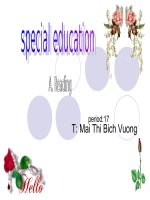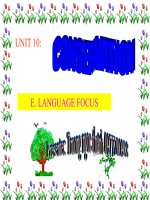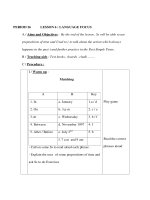Unit 4 Special Education Part E Language Focus
Bạn đang xem bản rút gọn của tài liệu. Xem và tải ngay bản đầy đủ của tài liệu tại đây (1.77 MB, 18 trang )
<span class='text_page_counter'>(1)</span>
<span class='text_page_counter'>(2)</span> She has lots of spots on her face. They are called “sports”. football. basketball. spot. sport. /spɒt/. /spɔ:t/.
<span class='text_page_counter'>(3)</span> Unit 4: SPECIAL EDUCATION Part E: Language Focus.
<span class='text_page_counter'>(4)</span> I. Pronunciation (sound 1). MinimalPairs Pair Minimal. /ɒ/. (sound 2). /ɔ:/. cod. cord. cot. caught. pot. port. fox. forks. spots. sports.
<span class='text_page_counter'>(5)</span> I. Pronunciation • • • • • •. /ɒ/ top boss doctor wrong job box. /ɔ: / [tɒp] call [kɔ:l] [bɒs]sport [spɔ:t] ['dɒktə] four [fɔ:] [rɒη] walking ['wɔ:kiη] [dʒɒb] more [mɔ:] [bɒks] talk [tɔ:k]. Notes: 0 đứng trước 1 hoặc 2 phụ âm( trừ r ) thường phát âm là / ɒ / Còn or, ou, our, au, all thường phát âm là /ɔ: /.
<span class='text_page_counter'>(6)</span> I.. Pronunciation /ɒ/. /ɔ:/. • 1. Put the socks on top of the box. • 2. He lost his job as a doctor in the hospital. • 3. What’s wrong with you, boss? • 4. Is walking called a sport? • 5. He can’t talk to her any more. • 6. Four of us have walked for fourteen miles..
<span class='text_page_counter'>(7)</span> II. Grammar and Vocabulary 1. The + adjective. Three men are blind. They are called the blind. They are old. They are called the old.
<span class='text_page_counter'>(8)</span> II. Grammar 1. The + adjective The + adjective: Chỉ một nhóm người có cùng một đặc tính nào 1 đó theo nghĩa chung của tính từ. Động từ theo sau phải chia theo chủ ngữ là ngôi thứ 3 số nhiều 3 (như với they). rich poor unemployed. sick injured. 2 4 5.
<span class='text_page_counter'>(9)</span> Choose the best answer A, B, C or D to complete the following sentences.. 1. The dumb …….. unable to say anything. A. is B.Bare C. am D. have 2. It is said that …. rich are not always happy. A. a B. an C. all D.Dthe 3.The little boy is helping the …… cross the street. A. poor B. rich C.Cblind D. young 4. The old ……. our help. A.Aneed B. needs C. needing D. not need.
<span class='text_page_counter'>(10)</span> II. Grammar and Vocabulary 1. The + adjective injured. poor rich. sick. unemployed. young. 1. The young have the future in their hands. 2. Ambulances arrived at the scene of the accident and took the injured …………………to hospital. 3. Life is all right if you have a job, but things are not so easy for the unemployed ……………………….. 4. Julia has been a nurse all her life. She has spent her life the sick caring for …………… 5. In England there is an old story about a man called Robin Hood. It is the rich and give the money to ……………. the poor said that he robbed …………….
<span class='text_page_counter'>(11)</span> II. Grammar and Vocabulary 2. used to + V0 Form:. +. Subject + used to + V0. -. Subject + did not use to + V0. ?. Did + subject + use to + V0…?. Wh. Wh + did + subject +use to + V0…?. Usage:. Cấu trúc trên dùngđể diễn tả 1 thói quen hay 1 trạng thái nào đó trong quá khứ mà nay không còn nữa..
<span class='text_page_counter'>(12)</span> II. Grammar and Vocabulary 2. used to + V0. 1. Dennis gave up smoking two years ago. He used to smoke 40 cigarettes a day. 2. Liz. used to have. a motorbike, but last year she sold it and bought a car.. 3. We came to live in Manchester a few years ago. We used to live in Nottingham. 4. I rarely eat ice-cream now but I used to eat. it when I was a child.. 5. Jim used to be my best friend but we aren't friends any longer. 6. It only takes me about 40 minutes to get to work since the new road was opened. It used to take more than an hour. 7. There. used to be. a hotel apposite the station but it closed a long time ago.. 8. When you lived in London, did you use to go to the theatre?.
<span class='text_page_counter'>(13)</span> II. Grammar and Vocabulary 3. which as a connector. “ Which” (as a connector) • “điều đó” dùng thay cho ý đã đề cập trước nó. • Which được dùng làm từ nối 2 mệnh đề. • Which luôn đóng vai trò chủ ngữ ở mệnh đề 2. • Động từ theo sau which phải chia ngôi 3 số it. • Giữa 2 mệnh đề phải có dấu “,”.
<span class='text_page_counter'>(14)</span> I. Pronunciation.
<span class='text_page_counter'>(15)</span> 2. Used to + infinitive. Tom 4 years ago. -Tom. Tom now.. is not fat now, but he used to be fat 4 years ago. -He didn’t use to take any exercise and he used to eat a lot 4 years ago ..
<span class='text_page_counter'>(16)</span> 2. used to + infinitive. Cathy 3 years ago.. Cathy now. -Cathy often goes to school by bike on her own -Did she use to go to school by bus? -No, she didn’t. She used to go to school by bike with her mother.
<span class='text_page_counter'>(17)</span> 3. Which. Look at these sentences, paying attention to the ways of using “which”. 1. This is the book. I bought it yesterday. This is the book which I bought yesterday. 2. Tom is blind. It means he can’t see anything. Tom is blind, which means he can’t see anything. 3. Lan passed the exam. This is good news. Lan passed the exam, which is good news..
<span class='text_page_counter'>(18)</span>
<span class='text_page_counter'>(19)</span>









